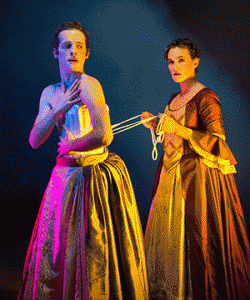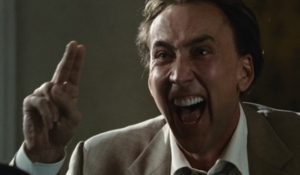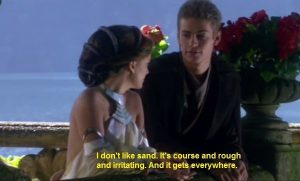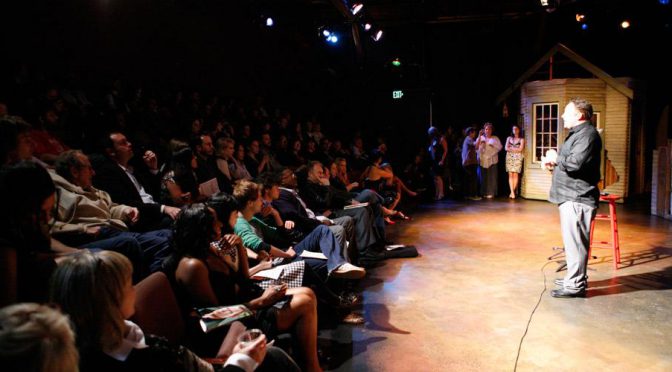As I’ve often said before, I tend to approach the world as a bit of a classroom. Everything you read, watch, take part in, or experience is something that can inspire your writing and make you a stronger storyteller. Your life experiences are easy enough to explain, they form the well you draw from to inform your characters and stories. What you read or watch is just as easy, giving you a look into the viewpoints of others and seeing what the rest of your genre might be like. But for some things it can be hard to quantify the benefits to writers. These I’ve come to call “peculiar inspirations”. “Peculiar inspirations” are things that seemed like common sense to me, only to later find out that they weren’t much common sense at all.
Years ago, while a friend was in school for screenwriting, I mentioned to her how I thought it would be a good idea if writing programs would have their students take an acting class as well. I’d taken two years of speech and drama myself in high school and another friend had a mandatory class as part of her animation program. And, while I can’t say how well it helps animators, I can say for a fact that my writing after that class made great advancements. In fact, while it may not make sense to everyone, that drama class actually worked as a turning point in my life. Though I’ve learned a lot since that day, that class turned out to be the time my writing started to resemble something “professional”. Of course I would suggest someone else do the same thing.
My friend’s reaction made it seem like I told her every writer should learn how to fly a plane.
Her argument, and arguments I’ve heard from others, is that writers and actors fill different roles and need to know different things. The two people fill very different roles within the industry and have to have very different skill-sets in order to be considered good at what they do. And this is entirely true, the skill-sets required to be a good actor are not exactly the same as the skill-sets required to be a good writer. But I never actually suggested that writers needed to be good actors, nor that an actor would be a good writer. Rather, what I suggested, and took a while to explain, is that in the process of trying to act, even for a bit, you learn something that is difficult for humans to grasp on a fundamental level: putting ourselves in someone else’s shoes.
Role Reversal

One of the hardest things to do as a writer is to put ourselves in the place of another person. Even a cursory glance around the internet will show you hundreds, even thousands of tutorials on how to try to fill out a character and make them more believable, how to get to know your own character, and how to make these things come out naturally. If you have any friends who are also writers, even if it’s only a small circle of friends, you know at least one person who has done these sorts of exercises. One that I see come along often is that you should “interview” your character to really get to know them. So you have people who are essentially talking to themselves and writing it down because otherwise it can be rough trying to figure out how another person would think.
It’s terribly important too, not something that we can simply just skip and hope no one notices. The fact is, even if we don’t recognize it, sonder is totally a thing and something we recognize on an instinctual level. If a character feels as though they don’t really live in that world, just serve a specific person, you can be nailed on it rather easily. if everyone feels like extensions of a single person, with reactions that all dovetail into each other, you start to expose the artificiality of your world. And, funny as it is to say as a speculative fiction writer, we can’t have our audiences recognizing the artificial nature of it all.

So, as a byproduct of this, the job of a writer is generally to present ourselves as close to someone with multiple distinct personalities as possible. The more personalities we seem to have, the better our world feels. But, of course, most of us aren’t lucky enough to have genuine disassociative identity disorder. double lives, or a drug problem. Unfortunately, that typically means we’re sorely out of practice trying to act like other people.
Humans don’t think in the position of other people by default. If we did, the concept of “sonder” wouldn’t even exist. And there’s nothing wrong with that – it’s impressive we even recognize our own sentience, let alone the sentience of others. The concept is so hard for us to grasp that entire philosophies have been born from the very difficulty of trying to put ourselves in other people’s shoes. If you’ve been on the internet for any length of time in the years since The Matrix, it’s almost certain that you’ve met at least one person who pitches the idea that the universe could just be a simulation and that you’re the only person you can confirm actually exists on any level. Generally, these people are either high, college students, writers with an existential crisis or, the really fun one, all of the above.

But that’s the thing about acting that really makes itself useful even to people who have no intention of ever acting. When you’re given lines and directions, when you’re assigned a character, you’re meant to do your very best to become that character. Even if you’re not good at it, if you give it your very best you’re going to find yourself understanding your character better than anyone else could because you had to actually think and move like that character on some level. Even the worst of actors have to understand what their character is thinking to deliver a line anywhere close to right. And, even if you should fail at that, it encourages you to try to at least think about it. Translating those thoughts into actions and communicating the character to others through that action can be difficult to pull off still, but that’s true even of people who wanted to be actors.

And, speaking of those actors, there’s another great benefit for someone who intends to go into play or screenwriting. Someone who’s stood in the place of an actor, even for a bit, will have a better grasp on when dialogue may be too clunky or when directions may be too exacting. Someone who has stood on a stage will have a better idea of just what it feels like to have to memorize lines that may not exactly be simple. They’ll have a better grasp on how certain gestures or mannerisms are just not going to be something you easily recall in the heat of the moment.
Think about how many great moments in TV and Movies have gone down in history that were ad-libbed. Generally those things happen not because of some inherent disrespect the actors have for the material, but rather the fact that whatever they were supposed to do wasn’t quite as natural as it should have been. In the heat of the moment, standing there and being that character, they behaved as they felt the character would and likely ignored something that didn’t feel like the character to them. Even if you’re a miserable actor, you’ll start to recognize when something on the page doesn’t feel right. In fact, one could argue that the worst actors are the ones who look at that, acknowledge that feeling, and then flat out ignore it.

That feeling is still beneficial even to someone writing prose, mind you. Because the feeling you get when you see a line that just doesn’t work is the same regardless of whether you’re giving it on stage, hearing it in an audience, or reading it off a page. That feeling is why it’s so often suggested that you read everything you’ve written out loud once you’ve finished it. In the middle of writing, especially if you’re working stream of consciousness, you’re not going to catch all those moments. But while you read it out loud it all becomes crystal clear. The difference, for actors, is that in the process of acting, since you have to memorize those lines, it’s already churning through your head before it reaches your mouth. Essentially, actors are more likely to get that feeling even before it reaches their lips.
There’s just as much you can’t learn from an acting class. Developing plots, story arcs, and characters from scratch can really be a pain in the ass and most actors just wouldn’t know where to begin. But that doesn’t mean that a writer can’t benefit from the experience of having to go through a piece of writing in such an intimate fashion. Every chance you get to actually act out someone’s writing and get a feel for what it’s like in motion is a chance to see just what works, what doesn’t, and what might be missing. There are just so many little benefits that, for a while, I couldn’t grasp why someone wouldn’t be able to see them – until I put myself in someone else’s shoes again.

The thing I realized, when I did try to see it from the other side, is that it wasn’t that the acting class didn’t have a benefit but rather that it didn’t seem to have enough. Writers chose not to be directly in front of the audience most of the time. We like to hide behind books, blogs, short stories and scripts. We like to keep that comfortable barrier, that bit of control, which lets us avoid humiliation. It’s not all of us, mind you, but it’s enough of us that I can say it with confidence. The idea of getting in front of people, whether it be on a stage or in a classroom, and really putting ourselves in that sort of peril easily sways the cost vs benefit ratio for most of us. But that right there is a lesson all of its own.
Writers are constantly having to face rejection, big and small, from so many different sources in our lives. Every rejection letter, every disapproving family member, and every criticism is another little jab at our pride and our security. It can be terrifying to put yourself out there and subject yourself to that. No one likes to be rejected or to feel humiliated, we all just really want to be loved. But in the process of taking a class that pushes you past those limits, you also start to chip away at that fear of rejection. Public speaking is often cited as being worse than death in polls. Yet, despite that, we know people often strive to do exactly that for a living. Before I took my drama class, I don’t think I could have had the courage to post hundreds of blog posts and then broadcast their links to the rest of the world. I don’t think I could have self-published books or tried to market them. I don’t think I could have been the person to put myself out there in the way I have.
So, regardless of your levels of talent, I think it would provide a benefit. There are a lot of reasons to be afraid of it, but just as many to give it a chance. Maybe you wouldn’t get all of the benefits out of it that someone like me had, but you’d be sure to find something. And I wouldn’t much worry about the quality of your results, because let’s face it…
Sometimes you just gotta turn into the skid.
(I write novels and dabble in screenplays. In the meantime you can find me on twitter, acting like I know what I’m doing on twitter.)







